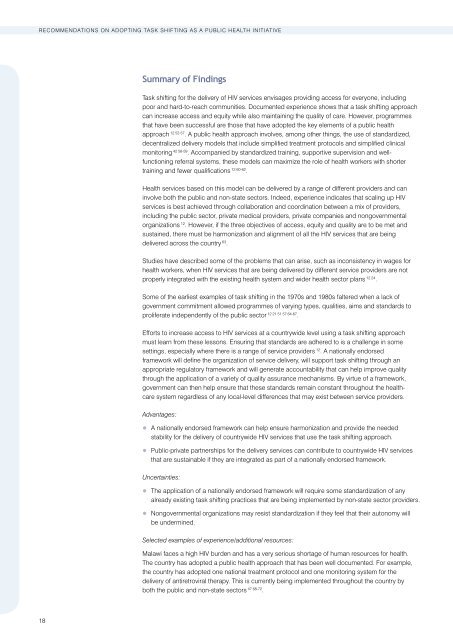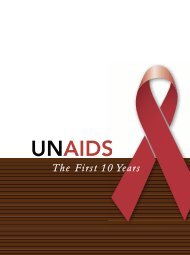Task Shifting - Global Recommendations and Guidelines - unaids
Task Shifting - Global Recommendations and Guidelines - unaids
Task Shifting - Global Recommendations and Guidelines - unaids
Create successful ePaper yourself
Turn your PDF publications into a flip-book with our unique Google optimized e-Paper software.
<strong>Recommendations</strong> on adopting task shifting as a public health initiative<br />
Summary of Findings<br />
<strong>Task</strong> shifting for the delivery of HIV services envisages providing access for everyone, including<br />
poor <strong>and</strong> hard-to-reach communities. Documented experience shows that a task shifting approach<br />
can increase access <strong>and</strong> equity while also maintaining the quality of care. However, programmes<br />
that have been successful are those that have adopted the key elements of a public health<br />
approach 12 52-57 . A public health approach involves, among other things, the use of st<strong>and</strong>ardized,<br />
decentralized delivery models that include simplified treatment protocols <strong>and</strong> simplified clinical<br />
monitoring 42 58-59 . Accompanied by st<strong>and</strong>ardized training, supportive supervision <strong>and</strong> wellfunctioning<br />
referral systems, these models can maximize the role of health workers with shorter<br />
training <strong>and</strong> fewer qualifications 12 60-62 .<br />
Health services based on this model can be delivered by a range of different providers <strong>and</strong> can<br />
involve both the public <strong>and</strong> non-state sectors. Indeed, experience indicates that scaling up HIV<br />
services is best achieved through collaboration <strong>and</strong> coordination between a mix of providers,<br />
including the public sector, private medical providers, private companies <strong>and</strong> nongovernmental<br />
organizations 12 . However, if the three objectives of access, equity <strong>and</strong> quality are to be met <strong>and</strong><br />
sustained, there must be harmonization <strong>and</strong> alignment of all the HIV services that are being<br />
delivered across the country 63 .<br />
Studies have described some of the problems that can arise, such as inconsistency in wages for<br />
health workers, when HIV services that are being delivered by different service providers are not<br />
properly integrated with the existing health system <strong>and</strong> wider health sector plans 12 24 .<br />
Some of the earliest examples of task shifting in the 1970s <strong>and</strong> 1980s faltered when a lack of<br />
government commitment allowed programmes of varying types, qualities, aims <strong>and</strong> st<strong>and</strong>ards to<br />
proliferate independently of the public sector 12 21 51 57 64-67 .<br />
Efforts to increase access to HIV services at a countrywide level using a task shifting approach<br />
must learn from these lessons. Ensuring that st<strong>and</strong>ards are adhered to is a challenge in some<br />
settings, especially where there is a range of service providers 12 . A nationally endorsed<br />
framework will define the organization of service delivery, will support task shifting through an<br />
appropriate regulatory framework <strong>and</strong> will generate accountability that can help improve quality<br />
through the application of a variety of quality assurance mechanisms. By virtue of a framework,<br />
government can then help ensure that these st<strong>and</strong>ards remain constant throughout the healthcare<br />
system regardless of any local-level differences that may exist between service providers.<br />
Advantages:<br />
• A nationally endorsed framework can help ensure harmonization <strong>and</strong> provide the needed<br />
stability for the delivery of countrywide HIV services that use the task shifting approach.<br />
• Public-private partnerships for the delivery services can contribute to countrywide HIV services<br />
that are sustainable if they are integrated as part of a nationally endorsed framework.<br />
Uncertainties:<br />
• The application of a nationally endorsed framework will require some st<strong>and</strong>ardization of any<br />
already existing task shifting practices that are being implemented by non-state sector providers.<br />
• Nongovernmental organizations may resist st<strong>and</strong>ardization if they feel that their autonomy will<br />
be undermined.<br />
Selected examples of experience/additional resources:<br />
Malawi faces a high HIV burden <strong>and</strong> has a very serious shortage of human resources for health.<br />
The country has adopted a public health approach that has been well documented. For example,<br />
the country has adopted one national treatment protocol <strong>and</strong> one monitoring system for the<br />
delivery of antiretroviral therapy. This is currently being implemented throughout the country by<br />
both the public <strong>and</strong> non-state sectors 47 68-72 .<br />
18

















